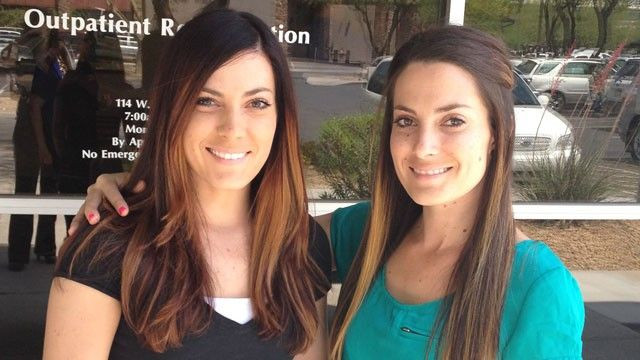
Kimberly Tucker had just completed a 5K run one day in April when she noticed she was feeling unusually weak and tired, so she returned home to take a nap. When she awoke, her vision was almost entirely closed, there was a sharp pain in the left side of her head and she was having trouble speaking coherently.
She immediately realized she was having a stroke as the very same thing happened to her twin, Kathryn Tucker, 26, exactly nine months to the day prior, ABC News reported.
"I instantly knew I had a stroke because I was suffering from many of the same symptoms as my sister," says Kimberly Tucker. "The EMT's told me that the chance of both me and my sister having a stroke this young was that of being struck by lightning twice. They thought I was suffering from dehydration or heat stroke."
Back in July 2012, Kathryn was about to go to sleep at her home in Tempe, Ariz. when she began to feel a sharp pain in the right side of her head as her vision slowly began to go out and she went numb.
Doctors at the urgent care facility told her she was having a migraine with aura and released her that night. Things started to get worse when she went home.
"I slept for three days straight," she said. "Then, when I woke up, my vision was horrible. Everything was distorted and one-dimensional. I could barely get around."
Her health began waning, so she returned for further analysis, at which point she was informed that she had a stroke.
The Tucker twins are fraternal, so they do not share identical DNA, and there is no history of stroke in their family and therefore has caused doctors to rule out the possibility of a genetic link in these incidents.
Both suffered a stroke stemming from opposite sides of the occipital lobe, which sends visual information from the brain to the retinas.
The two were also discovered to have minor heart ailments that could have contributed to the strokes, along with the fact that they are both smokers.
"Honestly, it's rare for us to actually evaluate two sisters who've had strokes within months of each other," said Dr. Joni Clark, a vascular neurologist at Barrow Neurological Institute in Phoenix. "If they had a family history, it would not be a surprise. It's quite uncommon."
One-third of all strokes are said to happen to people under 65, with the risk of stroke jumping in recent years for those younger than 45 from 14 to 20 percent.
"We see this mainly among young people who have risk factors that you should see in elderly patients, Clark said. "Here at Barrow, we see a huge population of stroke patients -- and, in my own experience, which is anecdotal, I see a fair number of young people with stroke. The majority are spontaneous."
The women are both doing well after spending some time doing occupational and speech therapy with only minor hindrances to their daily lives including occasional fatigue.
© 2025 Latin Times. All rights reserved. Do not reproduce without permission.




